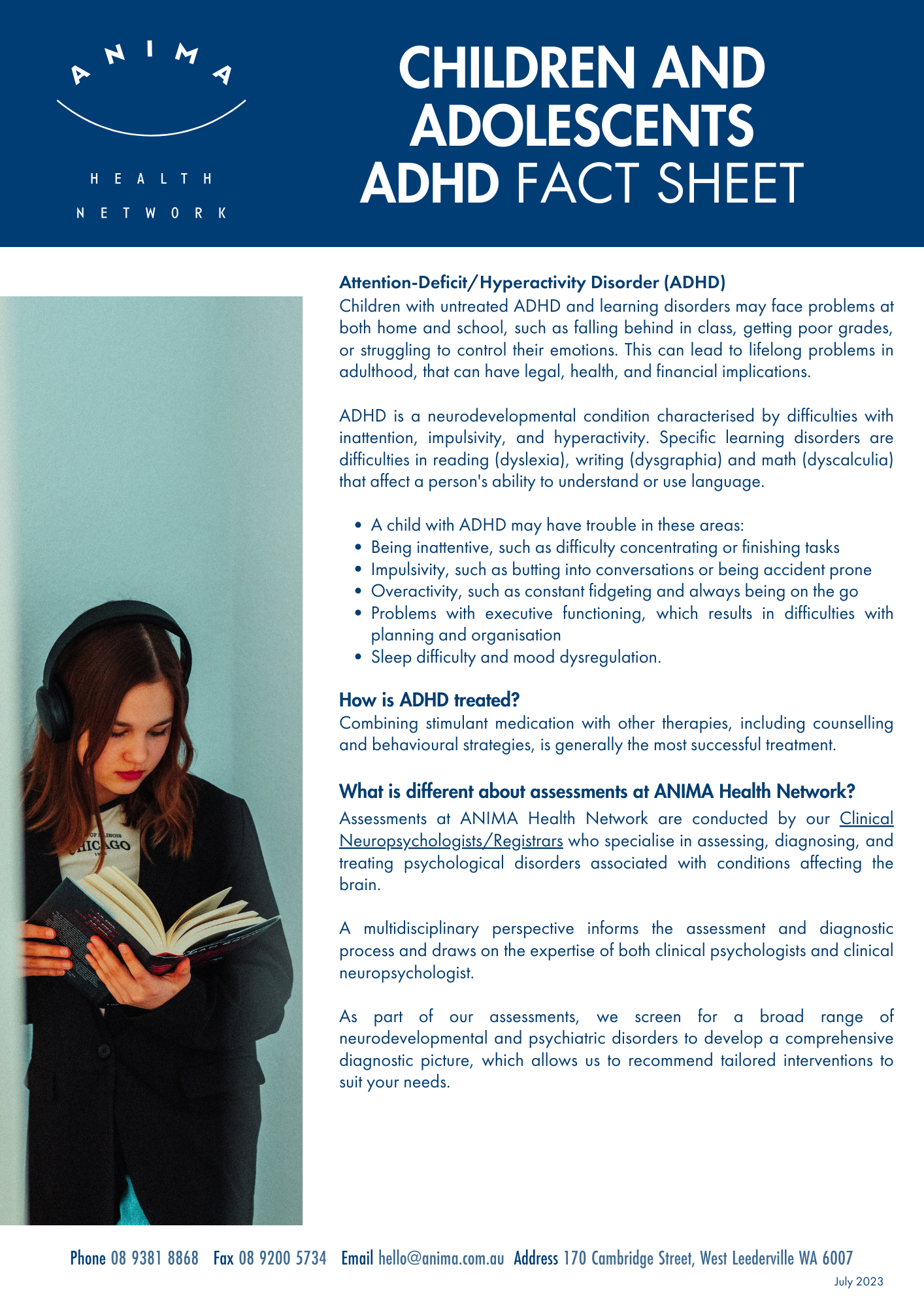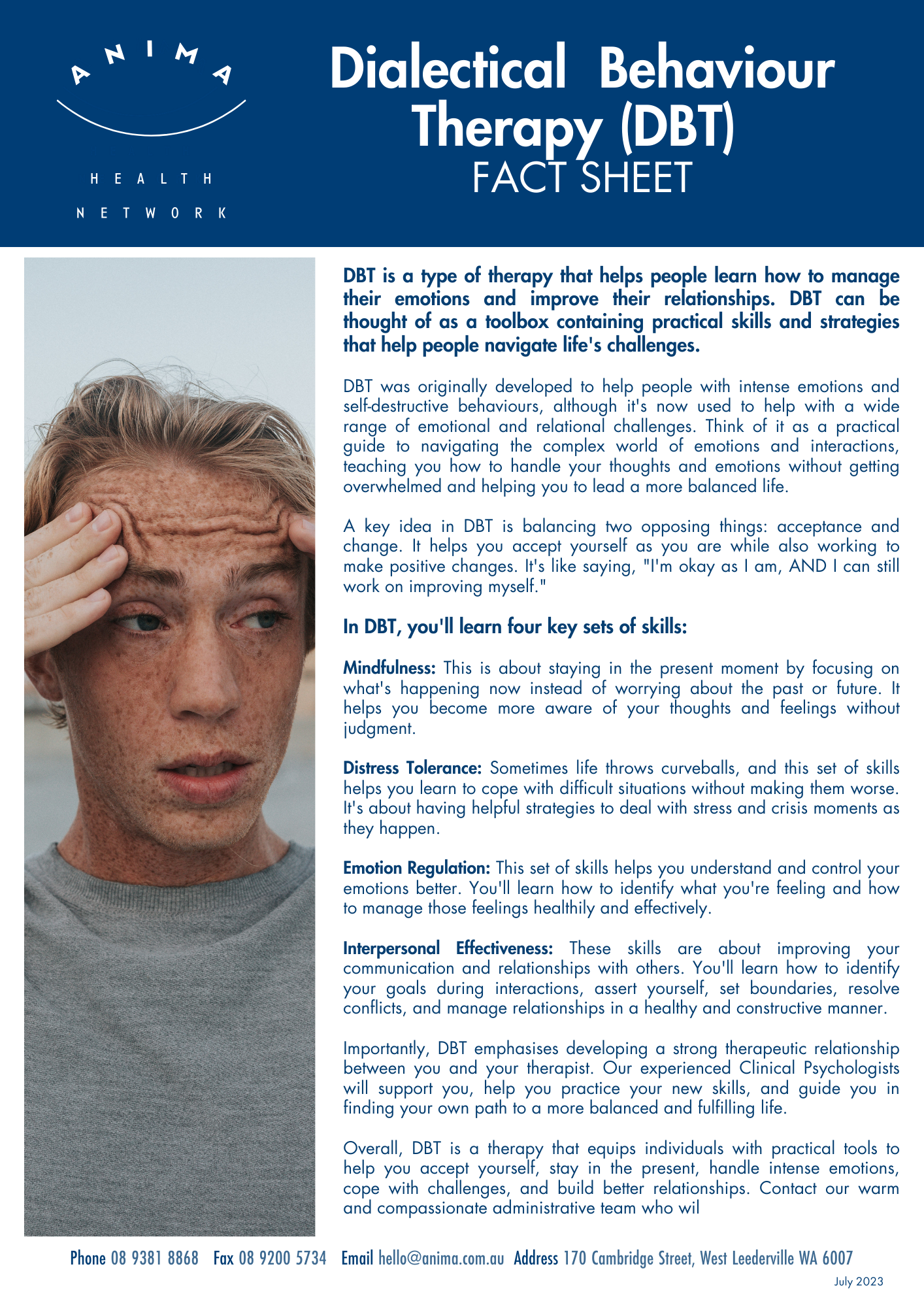Patient Resources
Find out more about our services and patient resources available here, along with a range of fact sheets listed below that can be downloaded for more detailed information.
With a diverse range of expertise, our Clinical Psychologists and Neuropsychologists have extensive experience in the field, our team is well-equipped to address various mental health challenges and support individuals on their journey towards lasting growth, healing, and lasting positive change.
Downloadable Fact Sheets
FAQs
-
What are some of the signs of ADHD in adults?
• Restlessness and Anxiety
• High Rejection Sensitivity
• Emotion Dysregulation
• Poor Impulse Control
• Difficulties with Concentration and Attention
• Poor time management and organisation skills
• Forgetfulness
• Constantly Losing or Misplacing Belongings
• Difficulties in interpersonal Relationships
• Substance Misuse
-
What are some of the signs of ADHD in adults?
• Restlessness and Anxiety
•High Rejection Sensitivity
Emotion Dysregulation
Poor Impulse Control
Difficulties with Concentration and Attention
Poor time management and organisation skills
Forgetfulness
Constantly Losing or Misplacing Belongings
Difficulties in interpersonal Relationships
Substance Misuse
-
Trouble paying attention or staying on task at school or at home
Doesn’t seem to listen or follow through on instructions
Avoids tasks that require sustained effort or attention
Easily distracted
It seems like their “motor” is running constantly
Constantly fidgeting, tapping their feet, or squirming in their chair
Talking excessively and often interrupting others
-
Children with untreated ADHD may face problems at both home and school, such as falling behind in class, reduced academic performance, or struggling to regulate their emotions. This can lead to lifelong problems in adulthood that can have a significant impact on their well-being and success.
-
If you wish to explore medical/pharmacological options for ADHD management, you will need to consult with a paediatrician or psychiatrist.
Adult ADHD
-
Trouble paying attention or staying on task at school or at home
Doesn’t seem to listen or follow through on instructions
Avoids tasks that require sustained effort or attention
Easily distracted
It seems like their “motor” is running constantly
Constantly fidgeting, tapping their feet, or squirming in their chair
Talking excessively and often interrupting others
-
Children with untreated ADHD may face problems at both home and school, such as falling behind in class, reduced academic performance, or struggling to regulate their emotions. This can lead to lifelong problems in adulthood that can have a significant impact on their well-being and success.
-
If you wish to explore medical/pharmacological options for ADHD management, you will need to consult with a paediatrician or psychiatrist.
ADHD in Children
-
• Problems reading and writing
• Problems with mathematics
• Difficulty telling the time
• Poor attainment of academic skills
-
• Problems reading and/or writing
• Problems with mathematics
• Problems dealing with changes in schedule or situations
• Difficulty telling the time
• Problems with organisation
-
Without support, children with learning disorders are at increased risk of academic failure, development of disruptive behaviours at school, and school drop-out (Gubbels et al., 2019). Children with learning disorders also tend to experience higher rates of anxiety, depression, low self-esteem, chronic fatigue, and loss of motivation (Sahoo et al., 2015). Assessment and early intervention can result in a better quality of life now and ensure that they receive the support they need to achieve success in their future.
If you have any questions about the assessment process or would like to find out more, please feel free to Contact us for more information about your individual situation and fees.
Specific Learning Difficulties
-
A clinical neuropsychologist is a psychologist who investigates the relationship between the brain and behaviour. Specifically, they specialise in the assessment, diagnosis, and treatment of disorders associated with conditions affecting the brain.
Such conditions include:
• Attention Deficit/Hyperactivity Disorder (ADHD)
• Specific learning disorders (SLD)
• Dementia
• Traumatic brain injury (TBI)
Clinical neuropsychologists can help patients and family members/carers better understand complaints and/or conditions of a neuropsychological nature and tailor interventions to optimise daily functioning.
How much training does a clinical neuropsychologist have?
It takes at least 8 years to become a fully endorsed clinical neuropsychologist. A clinical neuropsychologist must complete a 4-year Honours degree in psychology, followed by a 2-3 year accredited post-graduate degree focused on the assessment, diagnosis, and treatment of psychological disorders associated with conditions affecting the brain. Finally, clinical neuropsychologists complete a 1–2-year registrar program where they receive supervision from an experienced clinical neuropsychologist who is approved by the Psychology Board of Australia
-
• Confusion and disorientation
• Memory problems
• Poor planning and organisation
• Personality and behaviour changes
-
No. While we can diagnose ADHD, we do not prescribe medication. This would be best discussed with your GP and/or psychiatrist who is best placed to determine if medication of any kind is clinically indicated and in line with their diagnostic opinion.
Neurodegenerative Disorders
Meet Our Clinical Team
With a diverse range of expertise, our Clinical Psychologists and Neuropsychologists have extensive experience in the field, our team is well-equipped to address various mental health challenges and support individuals on their journey towards lasting growth, healing, and lasting positive change.

Ready to Book with Anima Health Network?
Please call us on 08 9381 8868 to book an appointment.
Alternatively, click below to fill out our new patient enquiry form and one of our friendly patient care team will be in touch.








